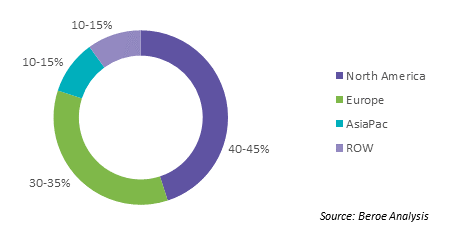COVID-19's Impact On The Clinical Trial Ancillary Supplies Industry
By Mathini Ilancheran, senior delivery lead - research, R&D, Beroe Inc.
With COVID-19 impacting the clinical trial supply chain, it is key for healthcare companies to keep their trials running. To ensure this continuity, it is important to be able to distribute drug products among regions and receive biological samples from those regions and transfer them back to central labs.1 Due to the pandemic, the world is moving toward a decentralized model of conducting clinical trials to enable a high patient retention rate as a result of COVID-19. With restrictions on logistics, and countries implementing new restrictions to address increasing COVID-19 cases, it’s important to understand how to manage clinical trials’ ancillary supplies — like sourcing from the right suppliers, managing distribution to all trial sites, stock management, and response to new regulations.2
ensure this continuity, it is important to be able to distribute drug products among regions and receive biological samples from those regions and transfer them back to central labs.1 Due to the pandemic, the world is moving toward a decentralized model of conducting clinical trials to enable a high patient retention rate as a result of COVID-19. With restrictions on logistics, and countries implementing new restrictions to address increasing COVID-19 cases, it’s important to understand how to manage clinical trials’ ancillary supplies — like sourcing from the right suppliers, managing distribution to all trial sites, stock management, and response to new regulations.2
The pandemic has disrupted the clinical trial supply chain, creating a shortage of ancillary supplies for clinical trials. Lockdowns have also resulted in logistical challenges involving transportation of ancillary supplies to various parts of the world. Diversification by global trial logistical companies of their supply bases is giving sponsors alternatives in Asian regions (such as India) and the Middle East. On the other hand, the demand for clinical trial ancillary supplies has spiked during the pandemic owing to the sheer increase in the number of clinical trials being conducted. Premier providers for cold chain clinical trials have experienced revenue growth as a result of commercial agreements with top pharma companies.
Trends Within Clinical Trial Auxiliary Supplies (CTS)
Industry Overview
The global clinical trial supply market is expected to grow at a CAGR of 7.2 to 7.4 percent and is estimated to reach $3.0 billion by 2026, from $1.8 billion in 2019. Globalization of clinical trials, increased demand due to COVID-19, regulatory restrictions, and increasing pressure to reduce the R&D spend are the key drivers of this category. Primary services in CTS such as storage, distribution, and supply chain management are outsourced to attain flexibility and to allow a greater focus on research. North America and Europe occupy the major share of the global CTS market due to the majority of trials being conducted in those regions, with larger supplier presence in the regions (Figure 1). Though North America holds the highest market share for ancillary supplies by revenue, based on supply availability, Europe has more global players, hence a higher supply availability to meet the demand.

Figure 1: Clinical trial supply market – by region (in %)
Supply Landscape
The supplier market for clinical trial supplies includes specialist players such as Covance, Catalent, Marken, Parexel, etc. and third-party logistics providers such as World Courier, DHL, FedEx, etc. providing equal capacity in the industry. Large players are moving toward consolidation in order to expand their supply base and global reach. Figure 2 describes the types of suppliers in this category. It is important for pharma to work with the right mix of suppliers to ensure uninterrupted trials.

Figure 2: Clinical trial supplies (CTS) – supplier types
Regional Reforms
- In the U.S., dependency on China for supplies puts the nation at high risk of supply shortages due to ongoing tensions and disruptions to inspections of supply firms in China.3 The U.S. government recently announced it is working to finalize an executive order that would provide long-term incentives for U.S.-based companies to produce medications and medical supplies domestically in the U.S.4
- The European Union is also working toward reforms in drug manufacturing to limit shortages of clinical supplies. It has realized the shortcoming of being dependant on supplies from India and China and is focused on increasing domestic manufacturing of clinical supplies.5
- In APAC, Japan has realized its reliance on imported medical supplies from China and South Korea has led to the country losing its ability to produce locally. In response to this, the Japanese government announced on April 7, 2020 that it would provide $2 billion in subsidies to help Japanese companies move their supply chains back to Japan.6 India is also dependant on China for certain supplies. However, the pandemic is leading to the revival of the ancillary industry and for pharma to become a self-reliant sector in that country.7
Shift Toward Direct-To-Patient (DTP) Deliveries
The FDA and other health authorities such as the EMA and those in China, Korea, Singapore, etc. are allowing DTP shipments for investigational product supply as an alternate distribution method. Direct-to-patient deliveries to ensure patient adherence and participation in clinical trials have increased post March 2020. As of April 2020, Marken saw an increase in the onboarded DTP trials in a few days, in contrast to the previous timeline of several weeks.8,9
In the EU, regulations do not address direct-to-patient, and the sponsor needs to get approval from the authorities to use it. Once the approval has been received, working with a clinical supply manager that has years of experience with direct-to patient in other countries (such as the U.S.) will facilitate the trial.10 This has led to a large number of job openings for clinical supply chain managers among suppliers, including Thermo Fisher Scientific, IQVIA, and Covance in the U.K., Belgium, France, and the U.S.
Key Technologies
Use of technologies in clinical trials can decrease the waste of supplies and increase patient-centricity. These are some of the widely adopted technologies that increase efficiency:
- Data analytics-based decision making (Interactive Response Technology): Integration of enrollment data and inventory levels using IRT, simulation software services, etc., will have a positive impact on overages and wastage levels. Ten percent cost efficiency boosts have been reported from analytics.11 During IRT selection, it is key to select a system that integrates with the pharma’s CDMO supplier for process optimization and EDC platform.12
- Blockchain technologies: Blockchain can bring benefits in time, cost, ease of processing, data safety, and patient control to clinical trials. Blockchain technology is being implemented in pharma procurement supply chain financial services platforms to improve efficiency, transparency, and financial operations.
Conclusion
The COVID-19 outbreak has greatly impacted the clinical trial ancillary supply value chain from pre-clinical through data analysis. One of the main reasons for such a huge impact is a general lack of demand forecast and feasibility planning. Continuous changes in regulations by regional governing bodies will affect the import of clinical trial supplies. In the future, pharma companies should adopt collaborative approaches for procurement of trial ancillary supplies and develop a diversified supplier base. Recommended measures to counteract shortages and supply chain disruptions include engaging in collaborative supply chain planning, whereby sponsors can maintain transparency in sourcing and gain clarity on inventory status and demand forecast to mitigate future risks to the supply chain. Diversification of the supply base can also mitigate any adverse impact of macroeconomic factors.
References:
- J. Spinner, "Marken: COVID-19 shaking up clinical trial supply chain," www.outsourcing-pharma.com, April 2020. [Online]. Available: https://www.outsourcing-pharma.com/Article/2020/04/02/COVID-19-disrupts-clinical-trial-supply-chain. [Accessed August 2020].
- MESM, "MESM (Avantor Clinical Services)," MESM, 2020. [Online]. Available: https://www.mesm.com/blog/managing-your-clinical-trial-ancillaries-supply/. [Accessed August 2020].
- FTI Consulting, Inc, "COVID-19: Impact on Global Pharmaceutical and Medical Product Supply Chain Constrains U.S. Production," 21 March 2020 . [Online]. Available: https://www.fticonsulting-asia.com/insights/articles/covid-19-impact-global-pharmaceutical-medical-product-supply-chain. [Accessed 08 September 2020].
- P. V. Arnum, "COVID-19's Impact on Global Pharma Supply Chains," 1 April 2020. [Online]. Available: https://dcatvci.org/6425-covid-19-s-impact-on-global-pharma-supply-chains. [Accessed 08 September 2020].
- Reuters, "EU eyes overhaul of pharma rules to tackle vaccine, antibiotic shortages," Reuters, 02 June 2020. [Online]. Available: https://www.reuters.com/article/us-health-coronavirus-eu-shortages/eu-eyes-overhaul-of-pharma-rules-to-tackle-vaccine-antibiotic-shortages-idUSKBN23924D. [Accessed 08 September 2020].
- L. Yang, "Pandemic Exposes Perils of Global Reliance on China for Drug Supplies," 20 May 2020 . [Online]. Available: https://www.voanews.com/science-health/pandemic-exposes-perils-global-reliance-china-drug-supplies. [Accessed 08 September 2020].
- PTI agency, "Urgent action required to revive the pharma ancillary industry: IPA," 09 June 2020. [Online]. Available: https://health.economictimes.indiatimes.com/news/pharma/urgent-action-required-to-revive-the-pharma-ancillary-industry-ipa/76271284. [Accessed 08 September 2020].
- Marken, "MARKEN’S DIRECT TO PATIENT SERVICES EXPAND TO MEET NEEDS OF CLINICAL TRIAL INDUSTRY DURING CORONAVIRUS PANDEMIC," 09 April 2020. [Online]. Available: https://www.marken.com/press-releases/markens-direct-to-patient-services-expand-to-meet-needs-of-clinical-trial-industry-during-coronavirus-pandemic/. [Accessed 08 September 2020].
- 4G Clinical, "The Complete Guide To Direct-to-Patient Clinical Trials," www.4gclinical.com/, May 2020. [Online]. Available: https://www.4gclinical.com/the-complete-guide-to-direct-to-patient-clinical-trials. [Accessed August 2020].
- B. Swites , "The Rise of Direct-to-Patient," February 2020. [Online]. Available: http://www.samedanltd.com/magazine/13/issue/319/article/5241. [Accessed 08 September 2020].
About The Author:
 Mathini Ilancheran is the principal analyst of R&D for Beroe Inc. She specializes in understanding market scenarios and industry dynamics across the globe in the outsourcing arena. Her analysis has enabled global fortune 500+ companies in their strategic decisions on service outsourcing contracts, category management and efficient sourcing. She has written for several publications related to R&D procurement opportunities. With her category knowledge, she has published 25+ articles in leading journals, co-authored with industry experts. She has a master's in management from University College London (UCL) and has worked as a consultant in the U.K. You can contact her at mathini.ilancheran@beroe-inc.com or connect with her on LinkedIn.
Mathini Ilancheran is the principal analyst of R&D for Beroe Inc. She specializes in understanding market scenarios and industry dynamics across the globe in the outsourcing arena. Her analysis has enabled global fortune 500+ companies in their strategic decisions on service outsourcing contracts, category management and efficient sourcing. She has written for several publications related to R&D procurement opportunities. With her category knowledge, she has published 25+ articles in leading journals, co-authored with industry experts. She has a master's in management from University College London (UCL) and has worked as a consultant in the U.K. You can contact her at mathini.ilancheran@beroe-inc.com or connect with her on LinkedIn.

